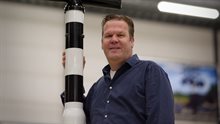Innovation in traffic management
In the FNS partner interviews, we feature a partner every week. Our partners give insight into developments and innovations within their organisation and their role in 6G Future Network Services.
Vialis, part of Volkerwessels, a leading traffic infrastructure company, plays an important role in the FNS programme, specifically with regard to the development and application of 6G technology around wireless sensing. During a recent interview with Danny Vroemen, responsible for consultancy and business development at Vialis, the company's ambitions and challenges in this innovative field were discussed.
What does Vialis do?
Vialis has focused on technological solutions for infrastructure, such as traffic control systems, highway signalling systems, and the technical installations of movable bridges, locks and tunnels, for almost a century. Danny explains, "We add intelligence to infrastructure. Whether it's traffic lights or railway switches, we provide the technology that makes it possible."
Vialis sees innovation as essential to its survival: "We have been doing this for almost a century, but to remain relevant, we need to innovate continuously. By being involved in the development of 6G technology within FNS, Vialis is contributing to advanced solutions. Here, among other things, we are looking at wireless traffic detection, which can replace traditional methods such as loops in the asphalt. This offers a more sustainable, efficient and future-proof alternative to traffic management," adds Danny.
Vialis sees opportunities in working with other participants in FNS, such as Fectar, in developing inclusive solutions, such as better support for the visually impaired with 6G-based haptic feedback systems near traffic lights. These innovative approaches are in line with the social trends of sustainability, safety and inclusiveness that are highly valued at Vialis.

The link with 6G
Although 6G technology seems seemingly far removed from traffic infrastructure, Vialis sees great opportunities in it. Within FNS, the company focuses on "wireless detection" within work package 3.4. Danny explains: "The use of 6G can replace expensive and maintenance-sensitive systems such as loops. If we can detect traffic at the same or a better level, that offers huge benefits for traffic management and sustainability."
Vialis is working with several partners in this work package, including Nokia, KPN, Future Mobility Park, RobinRadar, NXP and the municipality of Rotterdam. Experiments are carried out step-by-step, first in a closed environment and then in real life on the street. Danny on the approach: "We follow a 'learn fast, fail quick' approach. That means we want to discover quickly what works and what doesn't, so that we can adjust efficiently. If the technology proves successful, it could become a standard for future traffic management."
Practical applications
One of the most interesting applications of 6G is the data fusion between the 'sensing' part and communications. Danny outlines an example: "With the sensing part, we can see a bus, if we then see all the connections at that spot, you can estimate the passengers on that bus. Then we can also handle priority at a traffic light differently."
Steering group participation
In addition to their operational involvement, Vialis also has an important strategic role within the FNS programme through participation in the Supervisory Board. Remco van der Wielen, operational director at Vialis, represents the company in this steering group, which oversees the progress and coherence of the various programme lines within FNS. Danny explains, "Having internal support from our director is very valuable. His involvement not only helps to highlight the importance of 6G technology within the organisation, but also provides him with insight into adjacent markets and developments."
Challenges and opportunities
Although the prospects are promising, the implementation of 6G technology also faces challenges. One of the biggest obstacles is acceptance within the traffic industry, which is known to be traditional and conservative. "When I suggest doing something other than using loops, I often get immediate resistance. Yet we need to be open to new techniques and data sources and think about how to manage traffic when there are only other sources," Danny said.
Cooperation between sectors is crucial, especially when it comes to sharing and combining data. "Who has the access to the data, who will ultimately make money from this? Is it us, the operators, or yet another party? That is something we will have to develop as we go along," Danny argues.
The future
Vialis brings unique expertise to the FNS programme, Danny proudly says: "We know better than anyone else how traffic lights work and what the functional requirements of traffic management systems are. We combine this knowledge with market insights to offer specific solutions that contribute to a smooth, safe and inclusive mobility system."
Vialis' participation in FNS demonstrates the company's willingness to innovate and its excellent ability to adapt to the future. For Vialis, participation not only means technological advances, but also confirming their leading role in the sector.
Danny aptly sums it up: "It's cool that we're not just developing technology because we can, but that we're really looking at practical applications. It shows that we have been around for almost 100 years for a reason. We, as experts, continue to innovate to come up with future traffic management solutions together with eight million 'traffic experts'."
